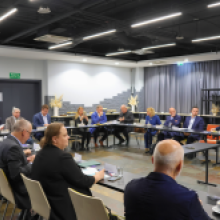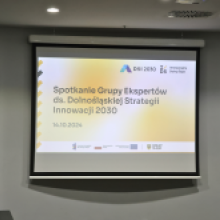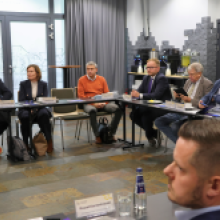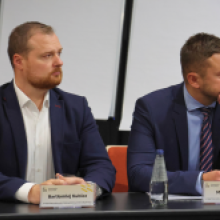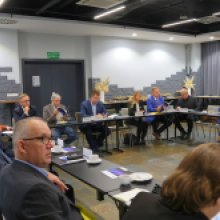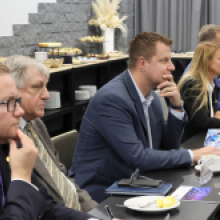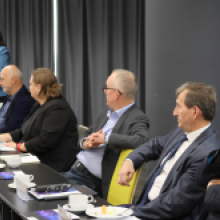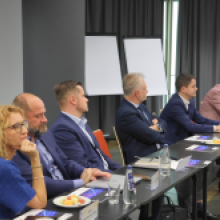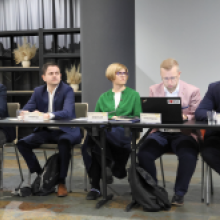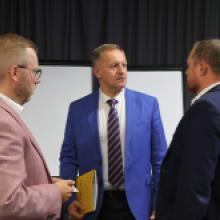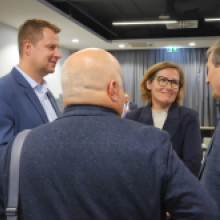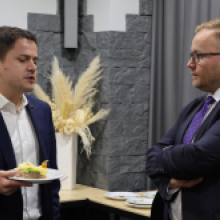
On 14 October 2024, the first meeting of the new composition of the Expert Group for the Lower Silesian Innovation Strategy 2030 was held.
In September 2021. In September 2021, the Board of the Lower Silesian Voivodeship appointed an opinion and advisory body, the Expert Group on the Lower Silesian Innovation Strategy 2030, which provides important support for regional authorities in the process of managing and implementing the innovation strategy in Lower Silesia. The Group consists of high-ranking experts - representatives of scientific and R&D units, the largest Lower Silesian companies, local governments, business support institutions and non-governmental organisations. Changes in the management of individual institutions, whose representatives make up the Group, necessitated the appointment of a new composition.
The purpose of the meeting was to assess which scientific fields and research areas are exceptionally strong in our region and already contribute, or may contribute in the near future, to innovation, as well as to identify the most effective methods of dealing with the commercialisation of innovation and cooperation between science and business.
The meeting was opened by Michal Rado, Deputy Marshal of the Lower Silesian Voivodship, who welcomed the guests and outlined the importance of innovation for the development of the region. He also pointed out the important role of the Experts Group as an advisory body and deeply immersed in the innovation ecosystem.
Then, Justyna Lasak, Deputy Director of the Regional Development Department of the Lower Silesian Marshal Office, reminded that in Lower Silesia, two groups are working on the shape of smart specialisations - the Working Group on Smart Specialisations and the Expert Group, and that their work complements each other, while the task of the Expert Group is to evaluate, direct and prioritise impulses coming from the Working Group.
Aldona Kucner, the meeting's moderator, in her introduction to the discussion recalled how the idea of Smart Specialisations emerged and the role of participatory processes, including the Entrepreneurial Discovery Process, in shaping them. She then asked the participants to introduce themselves and answer the question: which scientific fields and research areas are particularly strong in our region and are already contributing or may contribute in the near future to innovation?
In the course of the ongoing discussion, the experts identified areas that have a high potential to generate innovation in Lower Silesia, including:
- Biomedicine and Biotechnology (where we are seeing high growth in the potential and scientific staff of local universities)
- Military sector
- Medical technologies, including telemedicine
- Technologies for security in the broadest sense - from energy to food to the environment
- Solutions for adaptation to regional and local changes by small communities - both on the product and organisational innovation side
- Technologies and solutions for adaptation to climate requirements, including those for climate neutrality and green energy
- Artificial Intelligence (AI)-based solutions to support processes for green transformation, also with a focus on industrial use
- Closed-loop economy, including waste management
- Big data and telecommunications
- New forms of education
- Solutions for new mobility
- Space and quantum technologies
- Gaming, especially in the areas of VR and AR
- Technologies for Smart City, Internet of Things
In relation to the question of effective methods of commercialising innovations, participants identified the following issues:
- Access to funding, especially for technology development at further TRL levels
- Access to funding for the purchase and implementation of innovative solutions in the enterprise
- Priority for those research areas where there is currently high demand and financial investment (such as the military sector or climate security)
- Proximity and personal relations of individuals representing institutions that can cooperate in a consortium
It resounded in the experts' statements that innovation development will not be possible without prior investment in education. This is the result of neglecting the education of professionals already at secondary school level. It is therefore necessary to subsidise education both at secondary and tertiary level, as well as to encourage young talented people to participate in research projects. In addition, the region should seize the opportunity of increased spending on national defence from the state budget. It was also pointed out that a lot of innovative ideas are generated in Lower Silesia, but the region has problems implementing them due to insufficient funding. It was emphasised that due to limited funds, innovation support policy in the region should focus on two-three priority areas where innovations can be implemented quickly and efficiently. An analysis of the innovation support policy in the country and the region so far shows that we are unfortunately reactive and late. We should look ahead and think about what the technologies of the future will be. It is worth preparing a study on what Lower Silesia will look like in 20 to 30 years and what problems we want to solve there.














